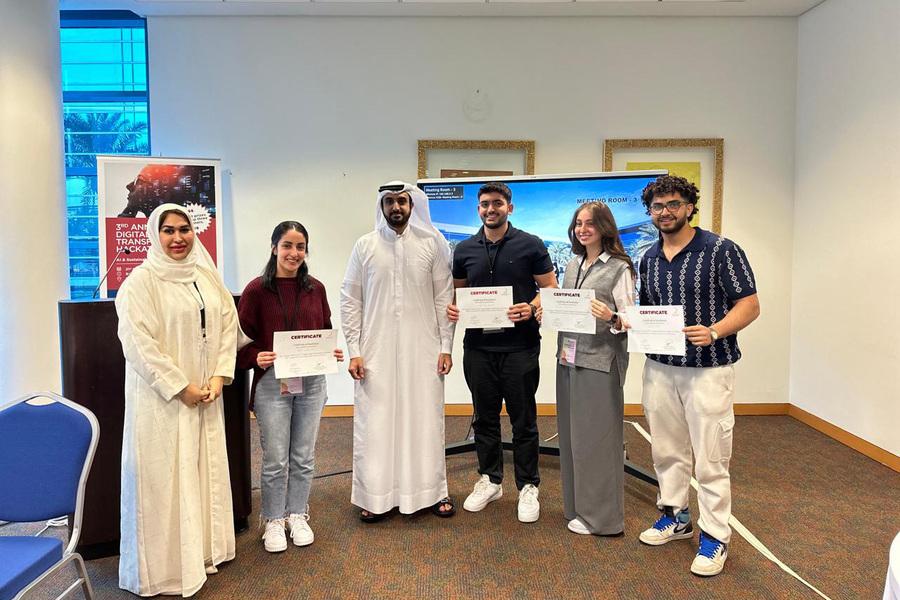- About
- Admissions
- Study at AUS
- Prospective Students
- Bachelor's Degrees
- Master's Degrees
- Doctoral Degrees
- Admission Publications
- International Students
- Contact Admissions
- Grants and Scholarships
- Sponsorship Liaison Services
- Testing Center
- New Student Guide
- File Completion
- New Student Orientation
- Payment Guide
- Executive Education
- Students with Disabilities
- Academics
- Life at AUS
- Research
- Contact Us
- Apply Now
- .

AUS team's water quality analysis solution triumphs at Digital Transformation Hackathon
In the third annual Digital Transformation Hackathon hosted recently by Zayed University, a team of computer science and engineering students from American University of Sharjah (AUS) emerged victorious in their pursuit of innovative digital solutions to real-world challenges in line with the UAE Centennial 2071 vision.
The challenge, crafted by the Mohammed bin Rashid Space Centre (MBRSC) among others, focused on enhancing a water quality monitoring system utilizing satellite-provided data, with a specific emphasis on artificial intelligence (AI). The winning AUS team, comprising students Aya Zabalawi, Hala Maadi, Ahmad AlShadid, and Hamza Khan, presented a cutting-edge solution that integrated deep learning and embedded systems techniques.
In their solution, the team developed a small version of the future deep learning neural network capable of running on an edge device like Field Programmable Gate Array (FPGA), allowing for faster and more efficient water quality analysis, thus significantly contributing to sustainability. Zabalawi developed a small mock version of the deep learning aspect to demonstrate the system's functionality, while Maadi conducted research on relevant regions of interest and compiled a literature review for factual support.
Khan collected data to train the deep learning model and analyzed essential metrics for accuracy measurements, while AlShadid planned out the software engineering methodology and workflow of the system, along with its features and functionalities.
"Our team's innovation was the incorporation of an FPGA edge device, reducing power consumption by up to 70 percent and providing MBRSC with a new opportunity for sustainability and efficiency," said Zabalawi.
The team’s exceptional performance earned them an invitation from MBRSC to further develop their project into a tangible product.
“Our victory in the hackathon highlights the potential for impactful collaboration between academia and industry. We're honored to have been invited by MBRSC to further develop our project, and we're excited about the opportunity to contribute to real-world solutions that address critical challenges,” said Khan.
“We have an active research group of computer science and engineering faculty working on how AI can be utilized to address key problems in the UAE using satellite data in a variety of domains. Water quality was one of these problems addressed by this team. Their success speaks to the quality of our students who are trained in exploiting cutting edge hardware technologies like the FPGAs with the latest trends in deep learning,” said Dr. Imran Zualkernan, Professor and Head of the Department of Computer Science and Engineering at AUS.
The Department of Computer Science and Engineering (CSE) in the AUS College of Engineering offers a Bachelor of Science in Computer Engineering, a Bachelor of Science in Computer Science and a Master of Science in Computer Engineering. The CSE curriculum focuses on artificial intelligence, data science and smart cities. AUS is ranked among the top four in the UAE and top 450 universities globally for computer science and information systems, according to QS World University Subject Rankings (2023).
For more information on the Department of Computer Science and Engineering, visit www.aus.edu/cen/cse.

